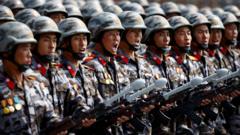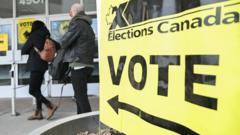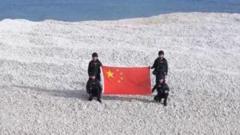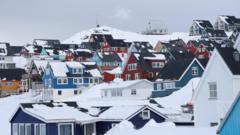As Donald Trump's Greenland comments stir international concern, Russia insists on closely watching developments related to the territory, emphasizing its strategic importance in the Arctic. With Danish and European leaders expressing strong opposition to the remarks, the situation poses potential risks for regional stability.
Tensions Rise Over Trump's Greenland Claims as Moscow Monitors Situation

Tensions Rise Over Trump's Greenland Claims as Moscow Monitors Situation
Kremlin reacts to Trump's assertions on Greenland with caution, highlighting ongoing geopolitical stakes in the Arctic.
Kremlin spokesman Dmitry Peskov announced that Russia is vigilantly observing recent statements made by US President-elect Donald Trump regarding Greenland. Trump, who stated that he would not rule out military action to secure the autonomous Danish territory, has intensified discussions around the Arctic's geopolitical landscape following comments from his son, Donald Trump Jr., who visited Greenland privately earlier this week.
Peskov emphasized that Russia views the Arctic as a zone of significant national and strategic interest and affirmed Moscow's commitment to maintaining peace and stability in the region. As Trump’s comments draw sharp responses from European officials, including EU foreign affairs chief Kaja Kallas and Germany’s Chancellor Olaf Scholz, who both underscored the importance of respecting the sovereignty of Greenland, the Kremlin expressed concerns about the implications of this “dramatic” situation developing around Trump’s rhetoric.
During a recent statement, Trump mentioned that both Greenland and the Panama Canal were vital to "economic security" for the US, leaving open the possibility of employing economic or military measures to acquire them. He further described the boundary with Canada as an "artificially drawn line," a statement that raised eyebrows given the close ties between the US and its neighbors Denmark and Canada.
Outgoing US Secretary of State Antony Blinken attempted to alleviate tensions during a visit to Paris, dismissing the notion of military intervention as "obviously not a good idea" and even less likely to occur in reality. Approximately 56,000 residents inhabit Greenland, a territory rich in natural resources and home to US and Danish military installations, though Greenland's Prime Minister Mute Egede has advocated for independence while relying on Danish subsidies.
British Foreign Secretary David Lammy acknowledged the potential destabilization from Trump's remarks while downplaying immediate concern. Danish Prime Minister Mette Frederiksen has also advocated for maintaining a strong US presence amid escalating North Atlantic tensions, particularly with Russia.
Meanwhile, the European Commission characterized Trump's aggressive stance on Greenland as "extremely theoretical," noting that he had yet to assume office. This dwelled into discussions about Greenland’s mutual defense status under EU clauses that obligate member states to assist if the territory were ever attacked.
The Kremlin ridiculed the European reaction as overly cautious and nearly silent, while discussions around Greenland’s potential independence from colonial legacies continue, with leaders arguing about the island’s future. A former Greenland foreign minister emphasized that many Greenlanders view the US as essential for their security, suggesting a "free association agreement" that would permit independence while allowing the US to retain defense obligations.
As Trump's claims grab attention, his allies echo the sentiment, with viewpoints framing Greenland not just as a territorial interest but as a crucial battleground for control over the Arctic's resources. With Russia actively enforcing its presence in the Arctic, the implications of Trump’s comments foreshadow a burgeoning conflict over interests in this increasingly strategic region.























